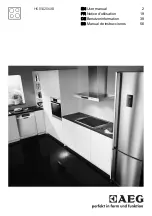
R
September 1, 2008
7014-082D
Page 5
CB 1200 Pellet Stove
2
Getting Started
A. Design, Installation & Location
Considerations
B. Fire Safety
Maintain the designated clearances to combustibles. Insu-
lation must not touch the chimney. You must maintain the
designated air space clearance around the chimney. This
space around a chimney is necessary to allow natural heat
removal from the area. Insulation in this space will cause
a heat buildup, which may ignite wood framing.
NOTE:
Clearances may only be reduced by means approved
by the regulatory authority having jurisdiction.
To provide reasonable fire safety, the following should be
given serious consideration:
1. Install at least one smoke detector on each floor of
your home to ensure your safety. They should be
located away from the heating appliance and close
to the sleeping areas. Follow the smoke detector
manufacturer’s placement and installation instructions,
and be sure to maintain regularly.
2. A conveniently located Class A fire extinguisher
to contend with small fires resulting from burning
embers.
3.
A practiced evacuation plan, consisting of at least 2
escape routes.
4.
A plan to deal with a hopper fire as follows:
In the event of a hopper fire:
a.
Evacuate the house immediately.
b.
Notify the fire department
CAUTION
• Do NOT connect this unit to a chimney flue servicing
another appliance.
• Do NOT connect to any air distribution duct or system.
Fire Hazard.
WARNING
• Do not operate appliance before reading
and understanding operating instructions.
• Failure to operate appliance properly may
cause a house fire.
1. Appliance Location
Consideration must be given to safety, convenience, traffic
flow, and the fact that the appliance will need a chimney and
chimney connector. It is a good idea to plan your installation
on paper, using exact measurements for clearances and floor
protection, before actually beginning the installation.
If you are not using an existing chimney, place the appliance
in a location to maintain a clear passage for the installation
of any listed and approved pellet venting system. This appli-
ance may be vented vertically or horizontally.
Maintain specified vent clearance to comubstible require-
ments listed by the pellet manufactures venting instructions
and all clearance to combustivles listed in this manual.
Check with your local building code agency before you begin
your installation. Be sure local building codes do not super-
sede UL specifications and always obtain a building permit
so that insurance protection benefits cannot be unexpectedly
cancelled. If any assistance is required during installation,
please contact your local dealer.
We recommend that a qualified building inspector and your
insurance company representative review your plans before
and after installation.
2. Thermostat Location
The thermostat’s location will have some effect on the
appliance’s operation. When the thermostat is located close
to the appliance, it may require a slightly higher temperature
setting to keep the rest of the house comfortable. If the
thermostat location is in an adjacent room or on a different
floor level, you will notice higher temperatures near the
appliance.






































